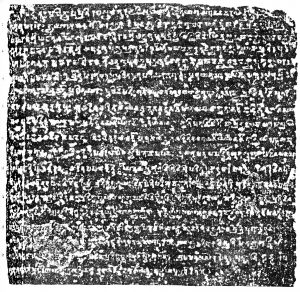
Bhitri pillar inscription, estampage (Wikicommons).
1-4) [Perfection has been attained]! The son of the Mahārājādhirāja, the glorious Samudragupta, who was the exterminator of all kings; who had no equal adversary on earth; whose fame was tasted by the waters of the four oceans; who was equal to (the gods) Dhanada, Varuṇa, Indra and Antaka; who was the very axe of (the god) Kṛtānta; who was the giver of many millions of lawfully acquired cows and gold; who was the restorer of the aśvamedha sacrifice, that had been long in abeyance; who was the son of the son’s son of the Mahārāja, the prosperous Gupta; who was the son’s son of the Mahārāja, the illustrious Ghaṭotkaca; (and) who was the son of the Mahārājādhirāja, the glorious Candragupta (I.), (and) the daughter’s son of Licchavi, begotten of the Mahādevī Kumāradevī,(who was) the most devout worshipper of the Divine One, the Mahārājādhirāja, the glorious Candragupta (II.), who was accepted by him; who was begotten of the Mahādevī Dattadevī; (and) who was himself without an antagonist (of equal power).
5) His son (was) the most devout worshipper of the Divine One, the Mahārājādhirāja, the glorious Kumāragupta, who meditated on his feet, (and) who was begotten of the Mahādevī Dhruvadevī.
6) The son of him, the king, who was renowned for the innate power of (his) mighty intellect (and) whose fame was colossal, (is) this (present) king, by name Skandagupta, who possesses great glory; who subsisted (like a bee) on the wide-spreading water lilies which were the feet of (his) father; whose fame is spread far and wide;
7) Who is amply endowed with strength of arm in the world; who is the most eminent hero in the Gupta lineage; whose great splendour is spread far and wide; by whom, practising (good) behaviour, the conduct of those who perform good actions is not obstructed; and who is again a soul well-disciplined in (musical) tāna and dhīdā.
8) By whom, having, with daily intense application, step by step attained his object by means of good behaviour, strength, good policy (and) valour was obtained (and) was employed as the means of (subduing his) enemies who had put themselves forward in the desire for conquest that was so highly welcome (to them);
10) By whom, when he prepared himself to restore the fallen fortunes of (his) family, several nights were spent on a bed that was the bare earth; and then, having conquered his enemies in battle, who had developed great power and wealth, he placed (his) left foot on the royal foot-stool;
11) The resplendent behaviour of whom, possessed of spotless fame, inherent, [but increased] by ……… forgiveness and heroism, which are emphatically unequalled, (and) which destroy the efficacy of the weapons (of his enemies), is sung in every region by happy men, even down to the children:
12) Who, when (his) father had repaired to heaven, conquered (his) enemies by the strength of (his) arm, and established again the ruined fortunes of (his) lineage; and then, crying “the victory has been achieved,” betook himself to (his)mother, whose eyes were full of tears from joy, just as Kṛṣṇa, when he had slain (his) enemies, betook himself to (his mother) Devakī;
14) Who, with his own armies, established (again) (his) lineage that had been made to totter ………(and) with his two arms subjugated the earth, (and) showed mercy to the conquered people in distress, (but) has become neither proud nor arrogant, though his glory is increasing day by day; (and) whom the narration of (his) mode of life, whether with songs or with panegyrics, is rising to the dignity of an Ārya;
15) By whose two arms the earth was shaken, when he, the creator (of a disturbance like that) of a terrible whirlpool, joined in close conflict with the Huṇas;………among enemies………arrows………proclaimed ……… just as if it were the roaring of (the river) Gaṅgā, making itself noticed in (their) ears.
17)………the fame of his father ………(saying to himself that) an image of some kind or other [should be made], he, the very celebrated one, made this image of that (famous) (god) Śārṅgin, [to endure as long as the moon and stars may last]. Having here installed this (god), he, whose commands are well-established, has assigned this village (to the god), in order to increase the religious merit of (his) father.
19) Accordingly, this image of the Divine One, and (this village) which has been here agreed to, both of these, he, the pious-minded one, has assigned for (the increase of) the religious merit of (his) father.